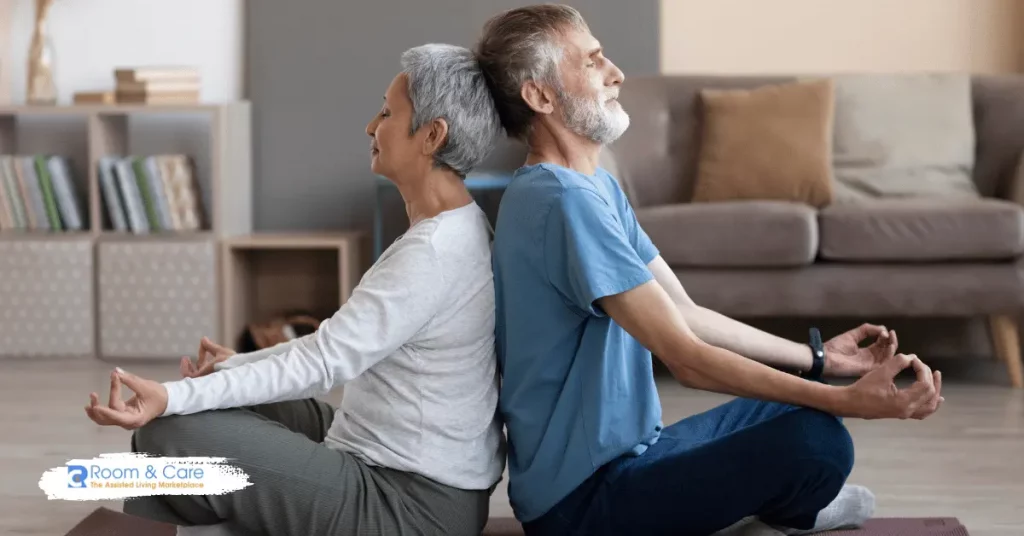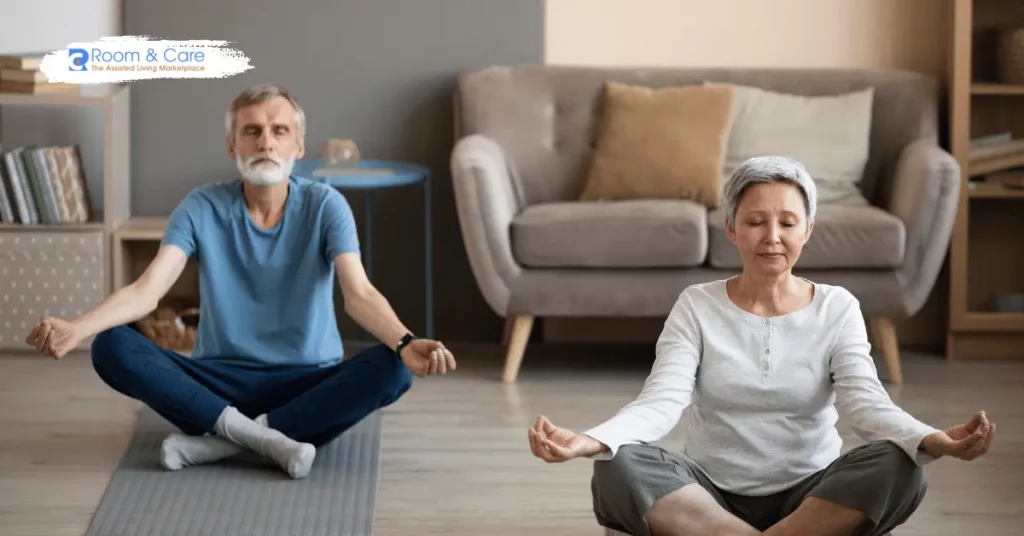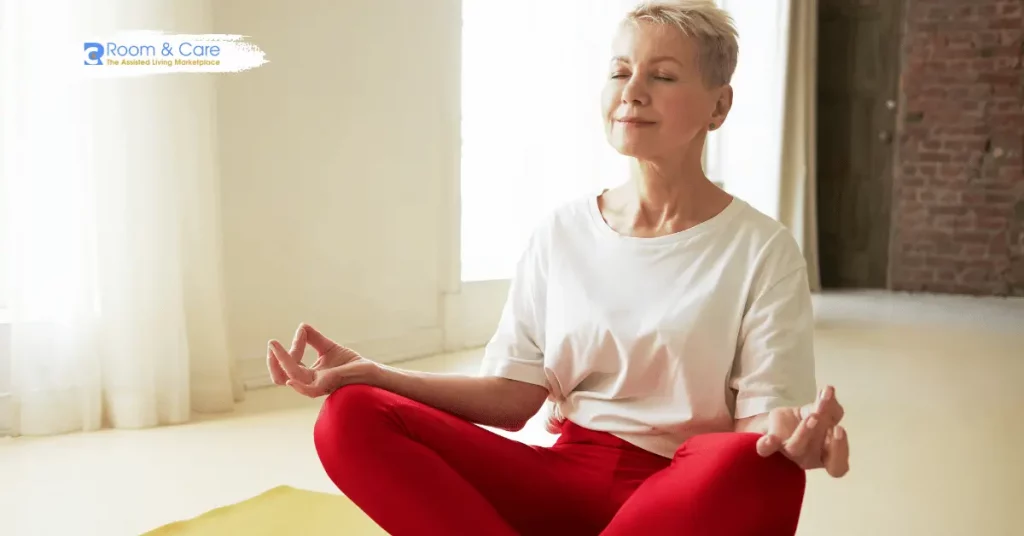

In recent years, meditation has emerged as an essential practice for promoting mental and physical health in seniors. Meditation for seniors is more than a trend; it is a proven technique for enhancing well-being, managing stress, and fostering inner calm. This ancient practice has found its way into various senior living settings, including assisted living facilities, adult family homes, and independent living communities. As more seniors turn to meditation to improve their quality of life, this guide explores the many benefits, types of meditation suited to older adults, and practical tips to help seniors incorporate meditation into their daily routines.
Meditation offers a variety of physical and mental health benefits for seniors, helping them navigate the unique challenges of aging. Many seniors face conditions like chronic pain, insomnia, anxiety, and depression, which can significantly impact their quality of life. Research has shown that regular meditation can alleviate these issues by reducing stress, improving cognitive function, and enhancing emotional resilience.
With more facilities integrating meditation into their wellness programs, meditation for seniors has become a powerful tool for maintaining independence and well-being. Whether practiced individually or in a group setting, meditation provides a moment of calm and introspection, allowing seniors to feel more grounded, focused, and connected.
Seniors have a wide range of meditation practices to choose from, each with unique techniques and benefits. Here are some meditation methods that are particularly suitable for older adults:
Mindfulness meditation involves focusing on the present moment without judgment. This practice can be done while sitting quietly or engaging in everyday activities like eating or walking. Mindfulness meditation encourages seniors to observe their thoughts and emotions, which helps reduce stress, enhance awareness, and improve focus.
Guided meditation is a great choice for seniors who may be new to meditation. With the help of an instructor or audio recording, participants are led through visualizations or calming scenarios to help them relax. Guided meditation is particularly effective in reducing anxiety and promoting a sense of inner peace.
Deep breathing exercises are simple yet effective meditation techniques that involve focusing on slow, controlled breaths. This type of meditation can help reduce blood pressure, alleviate pain, and promote relaxation. Seniors with limited mobility can benefit from this form of meditation, as it requires minimal movement.
Transcendental Meditation involves silently repeating a mantra to reach a deep state of relaxation. Practiced regularly, TM can reduce stress, enhance clarity, and improve memory. This meditation is ideal for seniors who may struggle with cognitive decline, as it promotes mental clarity and focus.
For seniors who prefer movement-based meditation, walking meditation combines mindfulness with gentle exercise. This practice involves focusing on the sensation of each step, the feel of the ground, and the sounds of the environment. Walking meditation is especially suited to independent living communities or adult family homes with access to outdoor spaces.

Starting a meditation practice can be simple and rewarding. Here are some practical steps to help seniors incorporate meditation into their lives:
Encourage seniors to start with just a few minutes of meditation each day. Starting small reduces any feelings of overwhelm and builds confidence. Over time, they can gradually increase the length of their sessions as they become more comfortable.
A quiet, comfortable space is essential for effective meditation. Assisted living facilities and adult family homes can create designated meditation rooms or quiet corners, helping residents feel at ease and focused. At home, seniors can set up a cozy spot with minimal distractions for their meditation practice.
There are many guided meditation apps, videos, and podcasts available that are tailored for older adults. These resources offer a range of options, from brief breathing exercises to longer guided sessions, allowing seniors to explore different methods and find what suits them best.
Consistency is key to reaping the benefits of meditation. Seniors should aim to meditate at the same time each day to establish a routine. This regularity helps meditation become a comforting part of their day and maximizes its positive effects on their well-being.
The health benefits of meditation extend beyond relaxation. For seniors, these benefits can lead to significant improvements in physical, emotional, and cognitive health. Here are some notable health advantages of meditation:
Assisted living facilities, adult family homes, and independent living communities are ideal places for seniors to practice meditation. Here’s how meditation can be integrated into these settings to benefit residents:
Group meditation sessions are a wonderful way for seniors to connect with others and practice mindfulness together. Organized meditation groups provide structure and motivation, making it easier for seniors to stay committed to their practice. Group sessions are especially beneficial in adult family homes, where residents often enjoy a sense of community and shared activities.
Creating a designated meditation room or quiet area within senior living facilities can encourage regular practice. These spaces offer a peaceful retreat where seniors can meditate without distractions. Independent living communities with gardens or outdoor areas can also host walking meditation sessions, allowing seniors to enjoy fresh air while meditating.
Training staff members on basic meditation techniques can make a significant difference. Staff who understand meditation can guide residents, answer questions, and even lead short meditation sessions. This support helps create a culture of mindfulness within the community, making meditation more accessible to all residents.
If you or a loved one is considering senior living options, finding a community that supports wellness programs, including meditation, can make a meaningful impact. Here are some factors to consider:
Our platform, Room and Care, connects you with top-rated assisted living facilities, adult family homes, memory care facilities, and independent living communities that prioritize quality care and wellness without referral fees or middlemen. Explore Room and Care for more information on finding the ideal community for your loved ones.

Meditation is a lifelong practice that can enrich the lives of seniors. Here are some tips to make meditation a sustainable, enjoyable part of daily life:
Q: Is meditation safe for seniors with health conditions?
A: Yes, meditation is generally safe for seniors and can be adapted to various health conditions. Those with specific medical needs should consult their healthcare provider for personalized advice.
Q: How often should seniors meditate?
A: Consistency is key; even a few minutes daily can make a difference. Seniors should aim for a regular practice but shouldn’t feel pressured to meditate for extended periods initially.
Q: Do I need special equipment for meditation?
A: No, meditation does not require any special equipment. A comfortable chair or mat is often all that’s needed.
Q: Can meditation improve memory?
A: Research suggests that meditation can improve cognitive function, including memory, by reducing stress and promoting focus.
Q: Can meditation help with sleep issues?
A: Yes, meditation is known to improve sleep by calming the mind and reducing anxiety, making it easier to fall asleep and stay asleep.
Meditation for seniors is an effective and enriching practice that can bring numerous health benefits, including stress reduction, improved cognitive function, and better sleep. For seniors in various living arrangements—from independent living to assisted living and adult family homes—meditation can foster a sense of community and provide a powerful tool for enhancing mental and emotional well-being.
When exploring senior living options, consider facilities that emphasize holistic wellness, with meditation and mindfulness programs designed to support the unique needs of older adults. Room and Care connects you with a wide range of senior living communities that prioritize wellness, without the extra cost of referral fees or intermediaries.
Meditation is a gift that seniors can give themselves at any stage of life. Encourage your loved ones to embrace this practice, and enjoy the journey toward greater peace, balance, and health.